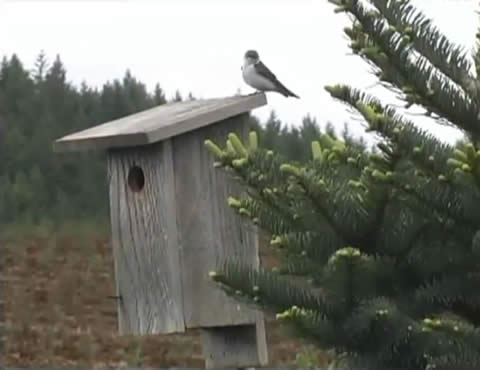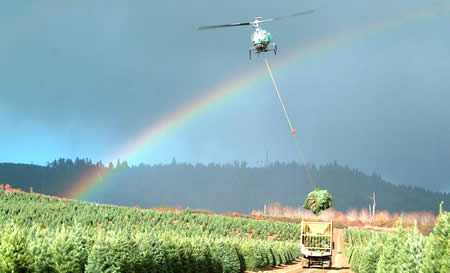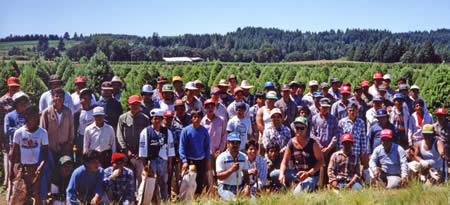Holiday Tree Farms is in the news! Read more »
Looking for wholesale Christmas trees?
Holiday Tree Farms is in the news! Read more »
Looking for wholesale Christmas trees?

Land is a finite resource, so we are careful to protect our natural environment. To minimize resource degradation, we use the latest proven scientific methods of field preparation, planting and fertilizer/herbicide application. Trees are harvested using helicopters to assure product freshness with minimal environmental impact. Holiday Tree Farms maintains an active relationship with Oregon State University, sponsoring research and environmental stewardship programs.
The plantation-grown Holiday tree is a renewable resource that is environmentally superior to oil based (plastic) artificial trees. Holiday trees decompose in landfills and quickly replentish soil nutrients rather than release toxins for a period of years.
Many uses for recycled trees are being developed and are gaining in acceptance. Holiday trees can be recycled into mulch for gardens after Christmas and avoid the overuse of area landfills.
Summer fallow periods and planting post-harvest cover crops generates organic matter, provides wildlife habitat and replenishes nutrients that renew the soil. Scenic greenbelts are created that protect water supplies.
These practices assure a strong and vibrant environment. Stewardship of our natural resources is a legacy of Holiday Tree Farms.
The health of farm grown trees is in direct relation to the resources that surround it. In turn, healthy trees provide habitats for all types of living entities.
Evergreens provide a safe haven year around for birds to use as protection and as a food source from insects on the trees.
Christmas trees also provide other benefits by their ability to absorb carbon dioxide and other gases. They in turn emit fresh oxygen which helps prevent the “Greenhouse Effect”. With over 8,500 acres of Christmas trees, we are able to provide more than just Christmas joy.
The Pacific Northwest has been blessed with an abundance of annual rainfall. Maintaining a healthy ecosystem demands good soil management practices and an attention to riparian and wetland areas. Doing our part to preserve our soil and maintain clean and healthy water systems is a daily activity that we embrace as industry leaders.
All of our farmland has buffer strips to prevent off-site runoff and soil loss. Between tree harvests, we plant a cover crop for a season to improve soil nutrients. When it is time to plant the next crop of trees, we utilize a no-till planting method in order to avoid soil erosion from wind and water.
Any roads are located and built to minimize soil erosion and with our Heli-Harvest we are able to utilize helicopters to bring trees to the processing yards— minimizing the number of roads required.

Our farms utilize an Integrated Pest Management (IPM) approach to controlling pests. Integrated Pest Management (IPN) is an environmentally sensitive approach that includes a vast knowledge of the life cycles of pests and how they interact with the environment. We identify and monitor the pests on our farms understanding that many are innocuous and others have distinct benefits.
When pest levels become an economic threat, we evaluate the proper control method that will be the most economical method of controlling pests and having the least possible impact on people, property and the environment.
 Our employee’s health and safety on the
job is one of our highest priorities. With over
100 full time employees and between 500 and 800
during harvest, a formal, documented employee
safety coordinator and program is a necessity.
Our employee’s health and safety on the
job is one of our highest priorities. With over
100 full time employees and between 500 and 800
during harvest, a formal, documented employee
safety coordinator and program is a necessity.
We include DVD video training for all employees and annual training for any employee involved with specialized equipment or tasks prior to work commencing. All supervisors are trained First Aid by a certified instructor and First Aid supplies are available to all employees. And, for general health and hygiene, toilets and hand-washing facilities are available to all employees and all work places are kept clear of garbage and debris.
Would you like to join the Holiday Tree Farms team? Visit our career center for more information.
 The
National Christmas Tree Association
(NCTA)
strives to be one voice representing Christmas
Tree Professionals and promoting the use of Real
Christmas Trees.
The
National Christmas Tree Association
(NCTA)
strives to be one voice representing Christmas
Tree Professionals and promoting the use of Real
Christmas Trees.
 The
Pacific Northwest Christmas Tree
Association, established in 1955, represents more than
1,000 farms throughout Oregon and Washington.
The association promotes the production of
high-quality, marketable trees, ensures
environmental stewardship among members, and
through voluntary member contributions, helps
educate the public on aspects of the industry.
The
Pacific Northwest Christmas Tree
Association, established in 1955, represents more than
1,000 farms throughout Oregon and Washington.
The association promotes the production of
high-quality, marketable trees, ensures
environmental stewardship among members, and
through voluntary member contributions, helps
educate the public on aspects of the industry.
 The
Oregon Association of Nurseries (OAN)
is a non-profit trade association that
represents nearly 1,000 individual nursery stock
producers, retailers, landscapers and related
companies serving the nursery and greenhouse
industry.
The
Oregon Association of Nurseries (OAN)
is a non-profit trade association that
represents nearly 1,000 individual nursery stock
producers, retailers, landscapers and related
companies serving the nursery and greenhouse
industry.